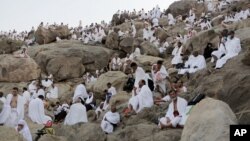Former Egyptian army officer Suliman Ouda minced no words as he climbed Mount Arafat, denouncing Islamist militants in Syria and Iraq as terrorists.
But Syrian engineer Ahmed Orabi, standing nearby on the hill where Muslims on their haj pilgrimage beg God's forgiveness, disagreed.
“Islam is about peace and kindness, not murder and violence, and I don't consider these fighters in Iraq and Syria to be Muslims,” Ouda told Reuters as he joined the mass of pilgrims early on Friday. “They bring shame to the word Islam.”
Torn over Islamic State group
Orabi, in his 40s, served time in Syrian prisons for criticizing the government of Syrian President Bashar al-Assad before fleeing to Turkey. One of his sons was still in jail.
“If the Islamic state, or Nusra, or any other group can fight the government, I'm in full support of them,” he said in a hushed voice.
“Bashar is the terrorist here, Iran is the enemy. And although I can't raise my voice today and say that, I'm crying out to God in my heart to give victory to those brave Islamic fighters.”
The haj, a hectic journey that brings millions from around the world to Mecca and Mount Arafat, is tinged this year with concerns over the threat posed by Islamist militants who threaten to target allies of the United States, including Saudi Arabia.
In past years, Shi'ite Muslim pilgrims airing political views were the main threat for security forces keen to keep the haj free from politics. But the rise of political Islam since the Arab Spring protests of 2011 has focused attention on Islamist Sunni groups as a new potential source of friction.
Random poll
While a systematic poll of pilgrims' views at the haj would be impossible, a random sampling indicated sentiment is divided over Islamic State, who have dominated the news since they captured Mosul, Iraq's second largest city, in July.
Abdel-Rahman al-Gahtani, a Saudi haj organizer, said the militants, known in Arabic as Daesh, gave Islam a bad name.
“Our sheikhs told us that Daesh are terrorists and we believe they are. Those who kill in cold blood and make threats to kill innocent people are not Muslims like us,” Gahtani, who works at food and water distribution, told Reuters.
The sermon given by the preacher in the local Namira mosque on Friday included a reference to the Islamic State and the pledge that “Islam is innocent of their actions,” pilgrims who attended said.
But Mohammed Askar, a Syrian teacher, said militants fired by religious zeal may be the only way to topple Assad.
“I know America and the Gulf countries see the Islamic state as terrorists, but they should not think that way,” Askar said.
“These are the people who can fight to get rid of Bashar, and after Bashar is gone I swear to you no one will want Islamic State. We are just using them.”
Heightened security for haj
Saudi Arabia, the world's top oil exporter, has funneled cash and arms to rebels fighting against Assad in a conflict that has raged for three years and killed nearly 200,000 people.
But it has also consistently opposed Islamist militants within the insurgency. Last week, Saudi air force planes pounded targets in Syria in U.S.-led airstrikes.
Security appeared much tighter than usual at this year's haj, with more men in uniform deployed in holy sites and frequent vehicle checkpoints.
“I came to haj two years ago and I don't remember seeing so many special forces as there are today,” said Amr Abdallah, an Egyptian engineer on his way to the summit of Mount Arafat. “They must be worried about the threat of Daesh.”
Interior Ministry spokesman Major General Mansour al-Turki said the kingdom has allocated more security personnel and National Guardsmen along its borders with Iraq.
“We have enforced our security readiness at all the border of Saudi Arabia, the northern border and the southern border,” he told Reuters on the sidelines of a news conference.
Warned against political protests
The authorities continue to warn pilgrims against any political protests.
Last week Interior Minister Prince Mohammed bin Nayef told the Saudi state agency (SPA) that Saudi Arabia will have a zero-tolerance policy.
“Authorities will deal with all propaganda, intellectual and political slogans because the purpose of haj is worship alone,” Prince Nayef said in a statement.
The haj has attracted some 3 million people this year, including 1.4 million from outside the kingdom. To the casual observer there appears to be fewer Iraqi and Syrian pilgrims than last year, and many more visitors from Asia.
Saudi authorities have said that no restrictions have been placed on visas to Syrians or Iraqi for political reasons, however.
“There are over 10,000 pilgrims from Syria this year and I'm not aware of any restrictions placed on Iraqis or Syrians, every country has a quota and we follow that system,” said Major General Turki





